#or how in an 'epic' you need these moments of great tragedy conflict strong emotion etc.
Explore tagged Tumblr posts
Video
youtube
My on-going little spotlights on some channels that made videos on Loki and Sylvie. PJExplained makes content in Hindi, but my gawd, he has the best and more enthusiastic reaction to the kiss that I’ve seen. And from his English descriptions on his videos as well his videos literally dedicated to analyzing their relationship, I feel he is on my wavelength about the dramatic and narrative potential here.
I wish so much that I understood Hindi enough to really appreciate his videos, or that Google could actually provide auto-captions when I need it for once (guess they can’t handle transcribing Hindi), but man, I just enjoy seeing someone so openly just going YAY for this. Most of the English speaking reaction YouTubers, kinda muted, especially from the guys. PJ’s very refreshing.
#sylki#pro sylki#sylvie x loki#just spotlighting#I remember seeing his reaction to episode 6 in a compilation vid#hands down the most into it guy#I get the gist that he is seeing the relationship in the kind of dramatic cinema light that Isee#or how in an 'epic' you need these moments of great tragedy conflict strong emotion etc.#well I'm assuming ofc#really wish I could understand even a bit of Hindi
19 notes
·
View notes
Note
Would you please make me a list of your rcommended comics(books or web-series any genre original content or fanworks)
Oh that’s a god one! Thank you so very much 💙 Let me see what I have on my shelf and on my hard drive. (I don’t know if I’ve ever made a list of my favourite comics before or not here on tumblr?)
in no particular order;
1: Usagi Yojimbo by Stan Sakai
I dunno if it ever really shows or not, but Japanese historical settings are something I’m really into! I think it’s one of those dormant interests that flares up every now and then. Anyway. Usagi Yojimbo has basically been tied for my favourite comic for over 10 years now. It’s a series of stories, both short and with longer arcs, following the character of Miyamoto Usagi (roughly based on Miyamoto Musashi) travelling around the country of Japan in the early 1600s as a Ronin after the lord he served was defeated and killed in battle. Usagi, being one of his samurai, is not killed in the same battle which, considering his lord was killed, is a massive disgrace in historical Japanese culture. Basically along the thought of “If your lord died and you didn’t you must not have fought hard enough to protect him.”
Anyway, the comic is both a history lesson on Edo period Japan, a travel diary, a slice of life comic, a Chanbara, an action comic, some times even a horror or ghost story, a tragedy involving unfulfilled love and lost families, a lesson on traditional Japanese Yokai and other mythology, and now and then high fantasy.
10/10. HIGHLY recommend. The author Stan Sakai is also a wonderful person I’ve had the pleasure to meet a few times at Comic Con. And considering he like... remembers who I AM despite being an extremely famous comic artist... I dunno. I have endless respect for the man and he’s shown me great kindness in the past.
Also you know... black and white comics. They’re my jam, yo!
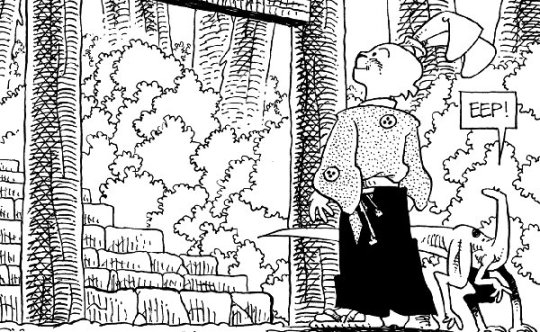
2: Bone by Jeff Smith
I have no idea if I even have to say anything because Bone might just, without hyperbole, be the greatest comic ever drawn.
At 1300+ pages drawn over the course of 10 years, the story starts out as a cartoon, full of hijinks and fun adventures and jokes and very slowly, reality starts setting in, things get more dangerous, the stakes get higher, the bad guys much darker. And by the time you reach book 3 of the 9 book story, you’re suddenly in a story of the “epic” variety. Not in the internet slang term but in the actual definition of the word.
You have massive wars between men and monsters, you have clashing cultures and ideologies, conflicting motivations and goals, and of course saving the world.
And it manages to do so without you EVER feeling “Excuse me but this was a cartoon book about funny jokes. This shift in tone is really weird and doesn’t work with the cartoony characters.”
It just blends and grows beautifully. And has remained as my favourite comic for... *counts* lord... 14 years now.
The book was recently released in a new colour version in case you prefer hat, but I honestly recommend “The Brick” single volume black and white version. It’s cheaper, first of all, but also I cannot express how masterful the blacks and whites of Bone are. They’re essentially Watterson level.
(also Jeff Smith is ANOTHER comic artist who is just like... the nicest person. Like REALLY nice. He’s been kind to me on occasions in that “you really didn’t have to be that nice” kind of way)
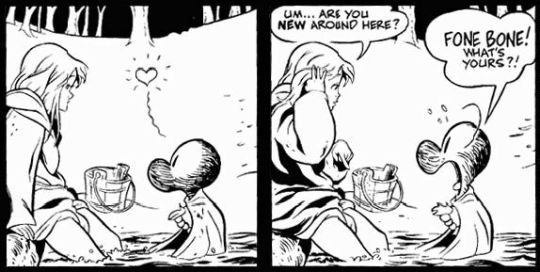
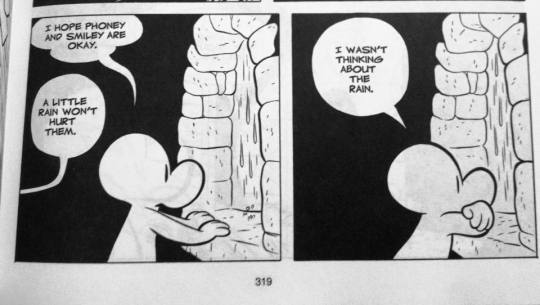
3: The Life and Times of Scrooge McDuck by Don Rosa
It’s published by Disney officially... but the Life and Times of Scrooge McDuck is essentially a fancomic. The only reason its not is because Don Rosa became SO GOOD at making duck comics Disney hired him to make them officially and he was SO GOOD at it became one of the most important Duck artists just after Carl Barks (the creator of Scrooge) himself.
The Life and Times of Scrooge McDuck is a comprehensive biography of Scrooge McDuck’s life, not just made up by Don Rosa, but pieced together from Carl Barks’ own comics where he would have Scrooge make passing mention to events in his past or people he met. Don Rosa essentially took all these passing remarks and mentions and drew out a timeline, starting with Scrooge age 13 leading all the way up to his reunion with his family when Donald as an adult met up with him again.
It starts with Scrooge, from a poor family in Glasgow in 1877, boarding a ship for America to seek his fortune. We follow him through the years as with each chapter, he comes close to being rich and successful, only for it to fail or fall apart at the last minute, until, eventually, we see him catch his break and become the obscenely rich and successful person he’s fought and worked and bled so hard to be.
...and then the comic continues. And we see him lose himself. Greed, the constant need for MORE money and MORE success keeps going. The need to show HOW rich and successful he is takes over, until we see him and his family fall apart. And the comic echoes Citizen Kane as Scrooge realises the best time of his life was when he was seeking riches, not after he finally succeeded.
And then Donald and his nephews appear, and Scrooge’s life gets a second wind. His lust for adventure flares up again, his need to seek fortunes and treasures burns as strong as ever. And he keeps going.
The Life and Times of Scrooge McDuck is a story about looking for your place in the world and fighting to create it with your own two hands, but it’s also about how you should think hard where you place your value in life, and it’s never too late to re-direct course and try again.
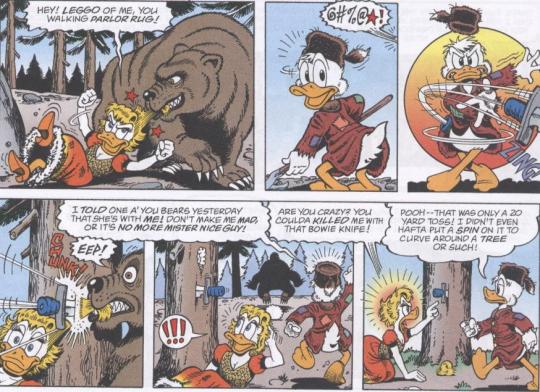
There is also “The Life and Times of Scrooge McDuck Companion” which is a collection of stories that didn’t fit in with the original comic and would have disrupted flow. Basically like how a fanfic will have oneshots related to a larger story
Also, the producer of the band “Nightwish” created a soundtrack to accompany the original comic as a sort of “What If” in what he imagined the story would sound like if it was made into a movie
youtube
4: Cucumber Quest by Gigi D.G. ( @ggdgart )
A newer comic I stumbled upon which has skyrocketed into being a fave and I can already tell, that’s not a position it’s gonna relinquish. Cucumber Quest is a more cartoony and comedic story than the previous comics on this list. But that by no means makes it of any less value or dulls the moments that this comic decides to punch you in the gut with emotions HARD.
The art and colours are glorious and something I hope to study so I can better my own art hopefully, and the writing and humour is of a calibre that I just know I could not replicate it if I even tried. Full of puns, absurdism, awkward jokes and a whole lot of FEELINGS, It manages to make me both laugh myself into a coughing fit as often as it makes me yell “OH NOOOO!!!” when something dramatic happens.
The story follows our main character Cucumber, a put-upon out-of-his-depth wizard-to-be who is tasked with saving the world from the evil Nightmare Knight who has been summoned from his thousand year slumber by an evil sorcerer who wants to take over the world (as you do). With him is his little sister, the sword wielding Almond, who is WAY more into this “being a hero” thing than he is (and probably better at it too) as the duo make friends and travel to the various kingdoms to defeat the Nightmare Knight’s lackeys, working their way up to fighting the Nightmare Knight himself and sealing him away once more!
That all sounds.... really straightforward, doesn’t it? Well... that’s what everybody else in the comic thinks too. ...Shame that real life is never easy and straightforward.
From evil henchmen that start crushing on cool “Good Guys” with cool swords, good guys who don’t REALLY want to hurt the bad guys because they don’t seem so bad? To cool good guys with cool swords suddenly learning that being in danger is not as much fun as it sounded when they started this. To big evil final boss bad guys who are just tired of all of this...
What’s also awesome is the entire comic... all OVER 800 PAGES OF IT... is completely free to read online! But you can also buy physical copies of the first 4 volumes in book form to support the author!
http://cucumber.gigidigi.com/cq/page-1/
I HIGHLY recommend this one too! It has canon LGBT characters! It has found family plots! It has scary bad guys that just need a hug! It has magical girl transformations! Literally anything you could want is in this comic. Including emotional wrecking angst! Did I mention FEELINGS???
(I couldn’t pick a single page so here are 3 random ones without context. Seriously almost EVERY page is so good I struggled very hard to choose)

-
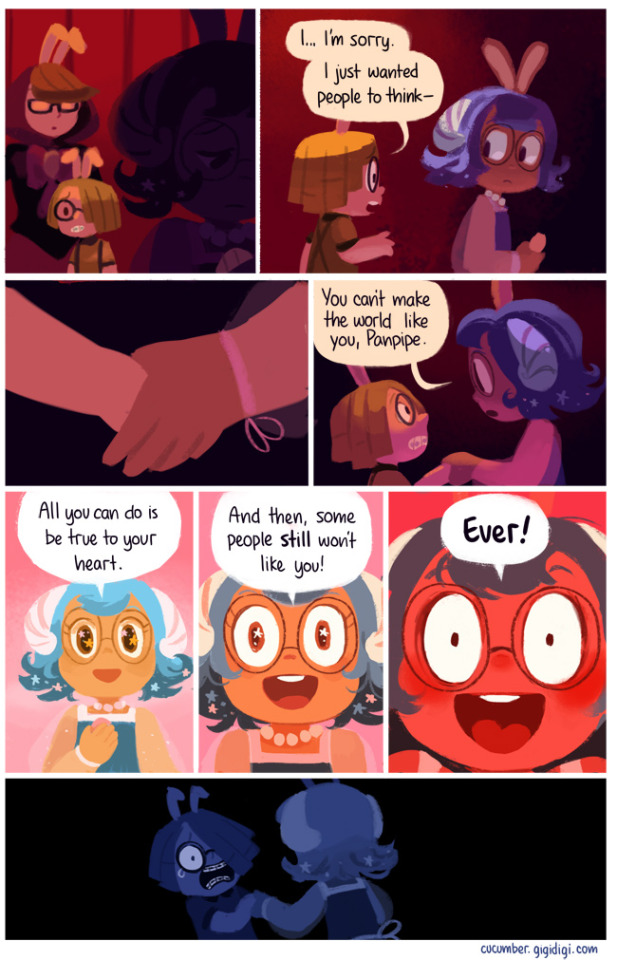
-
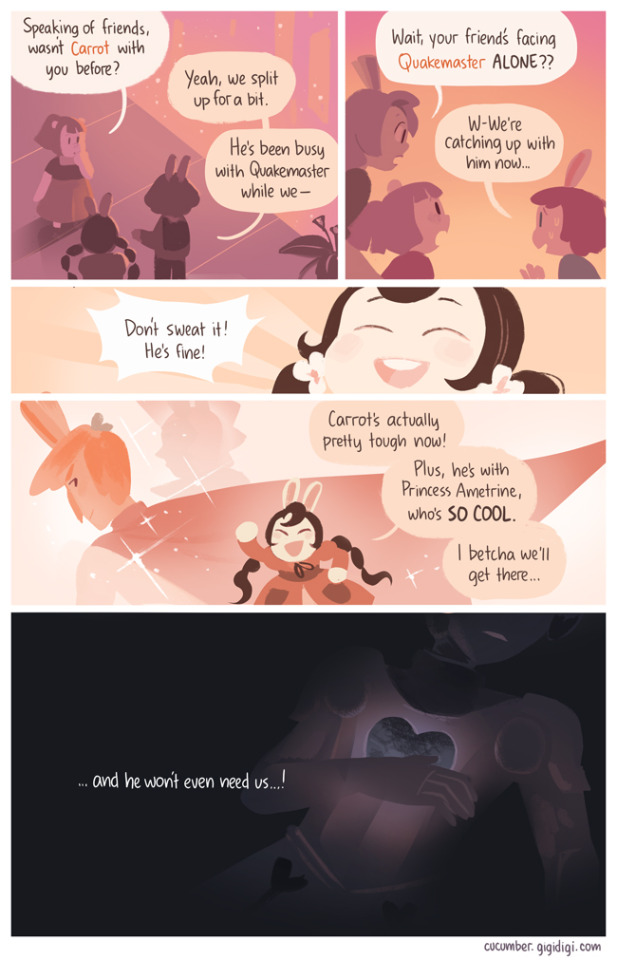
5: The Property of Hate by @modmad
Hey. Do you like fantasy worlds made of imagination? How about protagonists with grey morality who act like super primand proper gentlemen when they’re actually huge nerds? How about reluctant “Well I guess I’ve ADOPTED you now you annoying gremlin” adult-kid relationships? How about puns? How about abstract and colourfull character designs? Or saving the world?
The Property of Hate is Modmad’s original comic that they’ve been working on a few years now. it follows our lead character, RGB or “Problematic Mary Poppins” as I like to think of him, as he asks a young child if she’d like to be a hero and help him save his world? When she agrees, he takes her to a fantasy land... completely NOT preparing her for what she’s signed up for. The story then follows the duo through the abstract and shifting world as RGB slowly divulges information on what exactly our Hero has to do to save the world. It turns out it’s a lot more complicated and messy than merely “beat the bad guy” or anything like that.
Not to mention it seems this fantasy world has its own rules of reality and dangers. Emotions and abstract thoughts have real physical form here, and something like an “idea” can quite literally run around and create havoc, while something like dreams can fuel or destroy, and emotions like grief can cause irreparable damage.
Our Hero also learns RGB himself is a lot more complex and messy than he first appears. Seeming to be a good person trying to do good things (despite being a little stand offish and rude at times) but seems to also be carrying a past and the weight of having done some very very bad things “for the greater good”. And our Hero, as well as we, the readers, start wondering how much we should trust him, even though, just like our Hero, deep deep down we just know we WANT to trust him. And maybe he needs saving just as much as the world itself does. Even when he’s at his scariest and... not quite himself.
The Property of Hate is also available online completely for free. Modmad does have books for sale but I believe it’s on-demand or something along those lines. Please feel free to message them here on tumblr and they are happy to chat to their readers and interact.
http://thepropertyofhate.com/TPoH/The%20Hook/1
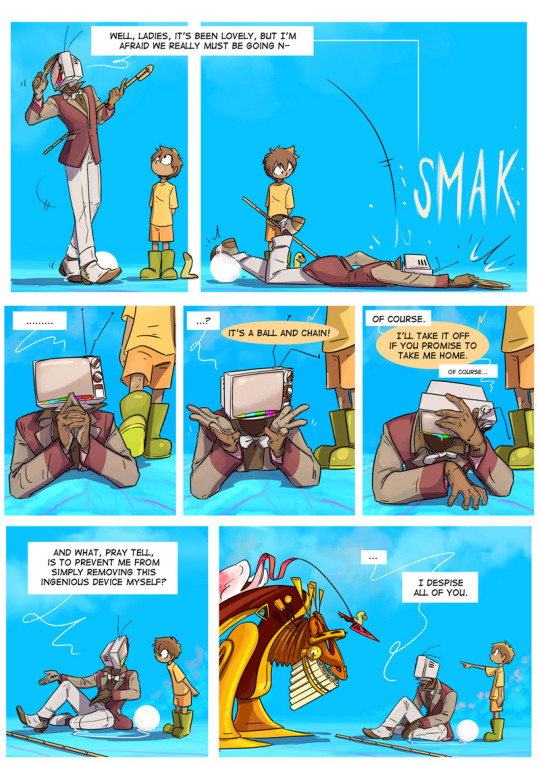
I think I’ll leave it there despite meaning to do 10 at first because this is already EXTREMELY long.
Hopefully you found something that seems interesting! Let me know if you decide to check any of these out and whether you ended up liking them or not! I’d love to hear your opinions.
And thank you for indulging me <3
(I’m trying to remember to add my ko-fi link to all longer posts like this I make. Especially since I keep forgetting ☕️Buy me a Ko-fi ☕️ )
#lucymelonbun#C-Puff answers#Long post#image heavy#Comics#comic recommendations#comic recs#I added a read more to this post but tumblr ate it so whatever#thank you for letting me ramble about stuff I like#I feel better <3
144 notes
·
View notes
Text
Weekend Top Ten #320
Top Ten Things the MCU Did Right
Blimey, we’re nearly there, aren’t we? Avengers: Infinity War actually opens THIS WEEK which means I might have even seen it by the time my next Top Ten goes out next weekend.
OH MY STARS AND GARTERS.
(Sorry, that guy’s not in the MCU yet is he? Okay, how about…)
SWEET CHRISTMAS.
(I guess he’s not in the films, but the Netflix shows are allegedly canon, so it counts, it counts!)
Anyway, before everyone dies horrible deaths at Thanos’ hands this week, I wanted to celebrate Marvel’s tremendous success here. I’m not a film expert, but I just don’t think this has really been done before; not on this scale, not with this many moving parts. Ten years, nineteen films and counting, a couple of dozen principle performers, multiple directors and writers, one overall storyarc that bleeds in and out of different individual stories… it’s a remarkable, unprecedented achievement. No wonder everyone else wants a bite of the cherry, even though nobody has been successful (and, as a big DC fan, it pains me somewhat to admit that).
The MCU is a minor movie miracle and we should all be supremely grateful that it’s around, still going strong, and hopefully will be for at least another ten years. And here, for the record, are my top ten reasons why it’s been successful; what Kevin Feige and his collaborators have done right.
Read it and weep, denizens of Universal’s Dark Universe.
They walked before they could run: I believe, initially, only three or four films were announced: Iron Man, The Incredible Hulk, Thor, and Captain America: The First Avenger. Although they started out with the intention of a shared universe, they also started small: four more-or-less origin stories focused on individual characters. There was an ambition to do Avengers, an intent, sure; but they didn’t take it for granted. They didn’t block out dozens of future release dates. By focusing on getting the first batch of films right, as individual films, it created a solid bedrock on which to build the rest of the universe.
They kept it grounded: The first batch of films were mostly set on Earth with threats that weren’t entirely world-ending. Nothing was a huge, huge deal until the Avengers happened. Eschewing the stylised world of, say, the Burton/Schumacher Batman films, the heroes of the MCU lived in the “real world”, and faced more “realistic” antagonists. This grounded the more fantastical elements; nothing was too wild or wacky. There were no talking trees, no alternate dimensions, no magic; even Asgard was presented more as a European royal kingdom in space, rather than metaphysical deities. They took their time to let viewers embrace the world, before cranking up the comic book aesthetic.
The films varied in tone and genre: This has become more apparent as the MCU has evolved, for good reason; whilst the first batch – coming out at a rate of only one or two a year – were content to be variations on origin stories, subsequent films have really tried to vary the style to avoid repetition or franchise stagnation. Even in just the Captain America films, we have a World War II movie, a 70s-style conspiracy thriller, and a globe-spanning epic action movie-cum-war film. Thor always leaned towards comedy, before fully embracing the crazy with Ragnarok; the Guardians of the Galaxy films are both action comedies, and Ant-Man is probably more comedy than action. Black Panther is practically a Bond movie. Meanwhile, the Avengers movies themselves have been content to play potentially world-ending threats relatively straight, and certainly the marketing for Infinity War has suggestions of epic tragedy. This means, even as we get three films a year, they never feel like sequels or retreads. Doctor Strange was the closest we’ve gotten in recent years to a “Phase One” style of movie, and even that was visually trippy enough to stand on its own.
Using S.H.I.E.L.D. as a bridge was a masterstroke: Represented initially by Clark Gregg’s Agent Coulson, S.H.I.E.L.D. served an important plot function by being the connective tissue between films; he’d go from talking to, say, Tony Stark to uncovering Thor’s hammer in the space of the same end-credit sequence. “You think you’re the only superhero in the world?” has become an iconic scene. S.H.I.E.L.D. allowed Marvel to create independent heroes in their own stand-alone stories, but similarly build a framework across the entire franchise, seeding the Avengers before the film was even a certainty.
…and destroying that bridge was an even bigger masterstroke: by the time of The Winter Soldier, we thought we knew what to expect from a Marvel movie. S.H.I.E.L.D. probably played the biggest role we’d seen at that point; Cap was working directly for them now, and they’d just saved the world in The Avengers. But by pulling the rug on the audience and the organisation – by having them infiltrated by HYDRA and then forcibly disbanded by Cap and Black Widow – it upended the apple cart. We didn’t know where they’d go from here. True, not many main characters were dying in the films, but there was now a sense that all bets were off; if they could, effectively, kill off S.H.I.E.L.D., then who knows what else they’d do? Destroy Asgard? Reveal Wakanda to the world? It also helped establish a new MCU, where they needed the Avengers, which in turn lead to a world which required the Avengers to be compliant to the UN. These decisions were made gradually, building upon past decisions, but each was a stepping stone to a more coherent and connected MCU.
They kept it light: pre-MCU – and even during their early years, really – the most successful superhero franchise was Batman, and the most successful iteration thereof was Christopher Nolan’s Dark Knight Trilogy. The po-faced seriousness of that, coupled with the rather morose tone of the DCU at large at that point, allowed the MCU to set itself apart with a focus on optimism, friendship, and wit. True, Bale’s Batman had the odd one-liner, but all of the characters in the MCU were funny, even straight-laced ones like Steve Rogers or Nick Fury. The colourful setting and witty repartee became a hallmark of the franchise, and a refinement of the style can be seen in increasingly sophisticated ways: Civil War is really a tragedy of misguided good intentions and conflicted emotions, yet still finds room for terrific moments of comedy, whereas Ragnarok is essentially a comedy that still gives us mass slaughter, major defeats for our heroes, corrupted patriarchs, and the destruction of an entire homeland. From the trailers for Infinity War, this style looks set to continue, with T’Challa and Okoye bantering about Starbucks before (I assume) literally everyone is murdered.
They learnt how to fly: sure, the opening films were grounded; yeah, they mostly focused on Earthbound heroes; fine, the majority of characters were either powerless or had a low-key skillset recognisable as advanced tools or peak athleticism (as opposed to a Loki skillset, which is basically great hair plus bitchy put-downs). However, as the MCU grew and became more successful, they smartly took risks, but also broadened their horizons. Guardians not only took us farther into space than was hinted at in Thor; it also gave us a talking raccoon and a living tree, multiple primary-hued aliens, a space station inside a giant head, and Peter Serafinowicz calling the good guys “A-holes”. Let’s not forget, too, that this was a full-on space opera with multiple planets, creatures, and ships, starring characters way outside the mainstream, that ended with a dance-off. Since then, the scope of the MCU has only widened, with Ant-Man giving us the Quantum Realm, Doctor Strange taking us on far-out journeys across the astral plane, and Black Panther even possibly showing us a version of the afterlife. Panther’s treatment of worldwide black history, slavery, and racism in America is also further proof of a maturing, confident, and intelligent forward momentum for the MCU.
They caught Spider-Man: seriously, however they managed it, whoever we need to thank – Disney, Marvel, Sony – bringing Spider-Man into the MCU is one of the best things to have happened. It instantly gives the character a new hook, and an identity closer to the comics: a youngster pretending to be an adult superhero, in a world where there are adult superheroes to look up to. But the scene in Civil War between Tony and Peter really epitomises all of the great ideals not just of those two characters, or the film, or the wider MCU – even though it does – but the ideals of superheroes as a fictional concept. “If you can do the things that I can do, and bad stuff happens, and you don’t do anything, then it happens because of you.” Spider-Man is utterly crucial to that film, to Tony’s arc, to the wider MCU, because he represents – in a very Superman-ish fashion, and far more Superman-ish than Superman himself has been allowed to be in movies recently – the inherent goodness of a certain breed of superhero. Having this young, vibrant, intelligent presence going forward is a tremendous achievement.
They let directors off the leash: the first few Marvels had great directors, for sure – Branagh, Favreau, Whedon – but there was a sense of sticking, more or less, to the “house style”. When Edgar Wright left Ant-Man, it was assumed his flamboyant tendancies did not fit with the tone of he MCU. But, weirdly enough, ever since then, directors have been allowed to be themselves. It seems possible for auteurs to exist within the Marvel framework, and the universe is better for it. The Guardians films are resolutely James Gunn, Black Panther is very much the vision of Ryan Coogler, and Thor: Ragnarok could not be more Taika Waititi if it was actually set in New Zealand. These more personal approaches to iconic characters have resulted in better movies, and a better franchise overall, as it allows films to shine individually and for the overall filmscape to feel less homogenous.
They cast it very, very, very well: in my opinion, above all else, the single most consistently excellent thing across the MCU is how right the casting is. RDJ is Tony Stark, in so many ways, and his casting really set the tone. Hemsworth brings so much to Thor; sure, he can play the rich royal demanding horses and drink, the self-centred swaggerer, but he brought a humour that wasn’t necessarily there on the page, and gave Thor the richness and depth he deserved. Scarlett Johannsen, Paul Rudd, Chris Pratt, Tom Holland… I could go on. Mark Ruffalo is so great as Banner you forget he was a recasting operation (ditto Don Cheadle). But far and away the best is Chris Evans. Getting Cap right was difficult, and Evans did seem like a strange choice: he played the jock-tastic Johnny Storm to a tee in Fantastic Four, but could he add the gravitas necessary for Cap? Could he make this straight-arrow guy a charismatic leader and screen presence? Yes. Yes he could. He is, in my opinion, the most perfect piece of superhero casting since Christopher Reeve, and embodies the character at least as well. He’s practically Captain America off camera, too. And he’s just one of literally dozens of well-cast roles in the series.
So there you are. My reasons why I think the MCU has been the success it is. This is my patented formula, so if any other studios want a shared universe, you’ll have to pay me. My price is a four-pack of Guinness and a Blu-ray of Batman: Mask of the Phantasm.
11 notes
·
View notes
Text
The X-Men Franchise, Ranked Best to Worst
In light of Fox’s most recent addition to the X-Men franchise, the stellar Logan, I decided to retrospectively weigh in on the history of the franchise. This is a franchise that really made me an X-Men fan, and it’s one I have enjoyed tremendously. Considering that Hugh Jackman is retiring his performance as Wolverine, and I’m still not quite over his performance in Logan, forgive me if I toot his horn a little too much over the course of this post.
1. Days of Future Past
Directed by Brian Singer

A feverish vision of marrying Singers original films with the First Class mutants pays off in the most spectacular fashion. An epic spanning across time to make sense of the franchise as a whole and create a working continuity - such an innately comic book-esque story. In many ways this is a crossover that trumps all others. It isn’t just the X-Men going up against a big bad. It’s the X-Men of the future trying to right the sins they made in the past. It’s as much an inward reflection on their morality and their motives as it is a physical struggle against a larger than life villain. The film really highlights the stellar cast that the franchise has acrrued over the years. Watch the scenes that Fassbender’s Magneto shares with Lawrence’s Mystique. Or Professor X and Magneto’s Last Stand against an onslaught of Sentinels. Or the meeting of Charles Xaviers old and young. Each one of them is a master class in acting.
2. Logan
Directed by James Mangold

Here’s the thing. Hugh Jackman is a better Wolverine than Wolverine. His 17 years spent evolving the character has transcended it’s comic book version. His impeccable ability to lend a vulnerability under all the gritty stoicism has been evident throughout the franchise, but it is especially evident in Logan. It is fittingly his final performance as the character. An incredible epic journey that charts Logan’s highs and lows. It showcases the drama, violence and tragedy that is ingrained in the character and sets it in a gritty spaghetti Western tour of America. Accompanied by a strong (and concise) supporting cast that includes Sir Patrick Stewart’s last performance as Professor X and Dafne Keen’s powerful portrayal of X-23, Logan is the swan song that Hugh Jackman deserved.
3. X2: X-Men United
Directed by Brian Singer
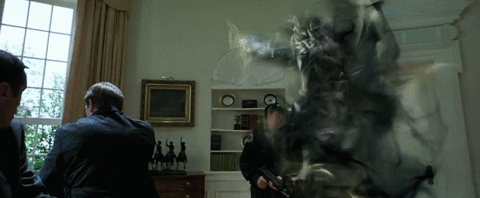
The X-Men franchise has the benefit of of having an infinitely colorful cast of characters to choose from. And while some films have gone a little overboard with this (Apocalypse, Last Stand), X2 did it best. It finds strong performances from all of its actors, particularly Alan Cumming’s show stealing performance as Nightcrawler. Brian Cox’s performance as William Stryker provides the kind of creepy misguided sense of justice that is the perfect opposition for the X-Men, in a storyline that borrows heavily from a Chris Claremont story, and shows his original vision of just how horrific discrimination can be.
4. X-Men: First Class
Directed by Matthew Vaughn

An incredibly well executed origin story from Matthew Vaughn, First Class foregoes the franchise’s love affair with Wolverine to instead focus on the origins of Professor X and Magneto. James MacAvoy lends a younger, slightly more brash interpretation of Charles Xavier that subtly and surely fills the role that will become the Patrick Stewart version of the 90s. And Michael Fassbender delivers a powerhouse performance as Erik Lensherr, charting the tragic backstory of the character that later defines his ruthlessness. MacAvoy and Fassbender play brilliantly off of each other, establishing the bromantic tension that defines Charles and Erik’s relationship. But the real star of the film is it’s very setting. Taking place in the 60s, in the same era that the X-Men were created by Stan Lee and Jack Kirby, First Class sets the struggle within the greater cultural context of the the height of the Cold War and the Cuban Missile Crisis. We’re left to ponder the political ideologies of the warring factions of mutants against the backdrop of humanity at its quarrelsome worst.
5. The Wolverine
Directed by James Mangold
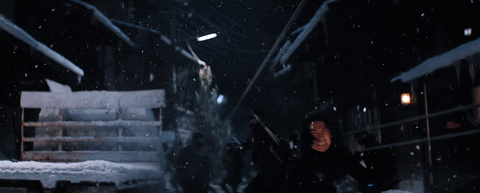
This is probably the first time Hugh Jackman is given a strong enough script to match his talent. Based off Chris Claremont and Frank Miller’s acclaimed debut story, the movie manages to surpass its source material. Claremont’s story shows a sensitive side of Logan by showing his love for Mariko Yashida, and the conflict that arises between him and the Yashida clan. While this relationship and conflict is very much present in the film, Mangold goes one step further by having Logan contend with his waning immortality. Hugh Jackman is able to play Logan in his most human vulnerability, contrasted with the more primal brutality of some of the film’s action scenes.
6. X-Men
Directed by Brian Singer
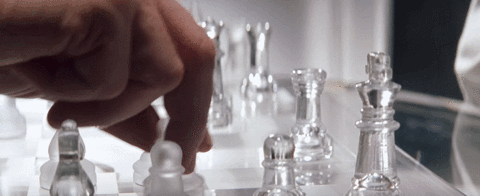
Brian Singer’s original vision for the franchise closely resembles the themes established by Claremont’s legendary comic run. X-Men is about the discrimination of those considered to be different. Charles Xavier’s group of outcasts struggling to find their place in the world, locked in an enduring struggle with Magneto and his need to establish dominance over a race he considers to be weaker. It is the discriminated fighting discrimination. It’s a socially conscious tale that will maintain its relevance for many years to come. And Singer really manages to execute it marvellously. And if it wasn’t for Wolverine’s completely inexplicable obsessive-creepy-barely-a-relationship with Jean Grey, it might have been higher on this list.
7. X-Men: Apocalypse
Directed by Brian Singer

Despite how much I loved this film the first time I saw it, I couldn’t bring myself to look past it’s many flaws when re-watching it. Like the poorly tacked-on Wolverine cameo (that would have payed off so much more if he wasn’t advertised in trailers), the re-hash of a Quicksilver scene from the previous film, or the unnecessary backstory that provides sympathy for Magneto yet again. Considering that at the end of Days of Future Past, Magneto was very much a villain, they could have simply carried on with this, instead of trying to add an emotional backstory and then have him turn to villainy again. Not only was it poorly executed (whoops my hand slipped), but it’s pretty poor writing considering it’s just two female characters that serve no purpose other than to further Magneto’s plot.
8. Deadpool
Directed by Tim Miller
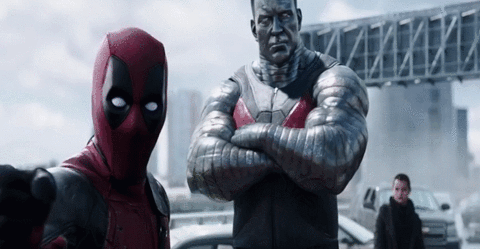
While I’m sure this film would be higher on most lists, I’m going to express my unpopular opinion that Deadpool is a pretty crappy superhero. And that’s evident just from watching this film. The use of meta-humour loses its novelty quickly and eventually just becomes an excuse for poor writing. Deadpool is known for his dark humour, and the film goes to great lengths to make this evident. A little too far, in fact- A moment when Wade Wilson is “flirting” with his “love interest” Vanessa results in the pair making light of the fact that they were raped as kids. I enjoy dark humour as much as any one, but I draw the line at child abuse. Wade’s relationship with Vanessa then becomes a major plot point in the film, as it mostly revolves around Deadpool’s need to save her from the creepy villain, and show her how much he loves her. But at no point do we see this “love” play out. We do see them have a lot of sex though. It’s an inherently flawed plot, but the film trudges on and delivers some stellar fight scenes nonetheless, and a strong supporting cast to keep us entertained. Ultimately, Deadpool is probably the closest adaptation of a comic book character I have ever seen, and if you’re a Deadpool fan, you will love this movie. If you aren’t, it’s hard to look past the inherent flaws in the film’s structure.
9. X-Men: The Last Stand
Directed by Brett Ratner

That “obsessive-creepy-barely-a-relationship” I mentioned earlier in X-Men comes to a head in this film. And it’s downright unbearable. Wolverine is reduced to a simpering mess for most of the film, pining over a confused and absurd interpretation of Jean Grey/Phoenix. The film burns through years of comic book storyline over the course of a few minutes, and foregoes any real character development to tease the final showdown between the Brotherhood and the X-Men, without ever really explaining the motivations behind any of the characters other than Magneto. The showdown is entirely underwhelming as a result of this, and the climax is totally disappointing. It would be a long time before the X-Men would ever be good again, and it’s entirely Brett Ratner’s fault.
10. X-Men Origins: Wolverine
Directed by Gavin Hood

Honestly, this movie is totally forgettable and I couldn’t bring myself to watch it again to write this review. It begins with a pretty promising montage that shows Jackman’s Wolverine and a sadly underutilized Liev Shrieber as Sabretooth fighting in wars spanning the century. It all goes downhill from there. In a franchise that drew so much from the comic book legacy of the X-Men, this film seems to ignore it completely. And while a re-interpretation of the story might have been acceptable, the film instead seems to have the goal of muddling the story altogether, burying any interest in fan-favourite characters along the way. The majority of the film can be summed up by the image of Hugh Jackman screaming with his claws outstretched.
#X-Men#Wolverine#hugh jackman#patrick stewart#ian mckellen#logan#old man logan#the wolverine#x men apocalypse#x men first class#x men days of future past#days of future past#x men origins: wolverine#x men the last stand#x2 xmen united#x23#deadpool#film review#film list#top 10#fox#chris claremont#stan lee#jack kirby#comics#superhero#superhero film#fandumb
4 notes
·
View notes
Text
Ebertfest 2018, Day 2: Critics Panel, 'Interstellar,' 'Selena,' 'Belle'
The morning after its audience had been given a shot of adrenaline with Andrew Davis' opening night film “The Fugitive,” Ebertfest had its own blockbuster event in the form of 14 critics talking about the state of their profession. As led by moderator Claudia Puig, the panel included Leonard Maltin, Nell Minow, Richard Roeper, Sheila O’Malley, Matt Zoller Seitz, Susan Wloszczyna, Sam Fragoso, Michael Phillips, Sarah Knight Adamson, Brian Tallerico, Scott Mantz, Rebecca Theodore-Vachon and Matt Fagerholm.
The subtitle for the event was “The Future of Criticism,” but given the the passion from the chorus of watchers and film-lovers, it concerned the state of movies itself. The lively active audience covered an expansive list of topics, including: the pros and cons of Netflix, given the accessibility of their material but the smaller screens; the Ava DuVernay test and the Bechdel test; the ultimate mission of the critic; our evolving attention spans as parallel by a growing amount of movies available each week; a hope for the industry to better embrace diverse narratives and diverse filmmakers.
At the end of the panel, Puig asked the critics to share what they think is the worst and the best thing about being a critic. The answers that came from the worst thing came from problems that reflect the current state: the changing amount of jobs and pay; an overwhelming amount of movies despite the desire to see them all; that people are criticizing movies based on trailers; and having to see a lot of bad movies, among others.
But the best thing about being a critic seemed to bring out the future of criticism, with everyone sharing their excitement about their work and a pride in their field. There was excitement about being able to advocate films that they love, the sense of community, the transporting quality of a good film and more. As Sheila O’Malley stated, “The best thing about being a film critic is that I am a film critic.”
After an extensive hour-long conversation, the panel was opened up to audience questions. When an audience member asked how to get paid for writing about film, Rebecca Theodore-Vachon advised to have a platform for your writing, and the need to network. She also emphasized the need to follow editors and they people they follow on social media, and to send pitch letters.
When asked about what makes an effective critic, Leonard Maltin said that “you must have love, passion and knowledge.” It was a fitting response given values of those on the panel. But those qualities could also help define what made the second day's film choices so powerful, whether it was "Interstellar," "Selena" or "Belle."
youtube
The first film of the day was Christopher Nolan’s galaxy-hopping sci-fi epic “Interstellar,” as presented with an incredible 70mm print. But before that movie started, the crowd at Ebertest heard from the filmmakers of “Disturbing the Peace,” a documentary about the Israeli/Palestinian conflict that premiered at Ebertfest a couple of years ago. Co-director Stephen Apkon shared an update about the film, which has been on an “extraordinary two-year journey” since starting at Ebertfest. Among the exciting details about the film’s journey is that it is has screened for six consecutive months in Palestine and Israel, and is now available in 23 films. They also mentioned that there was a screening in which the film was projected on the West Bank wall, with Israelis and Palestinians watching the film “under a full moon and starred sky.” They said that it was a life-changing event, especially with the standing ovation that they received. It’s a special honor and memory to think that such a significant film started at Ebertfest.
That importance of empathy then played out on a massive screen and over the course of three hours with “Interstellar,” which was introduced by our own Brian Tallerico as “the perfect film for a festival about empathy … the rare sci-fi film that’s about emotion and connection." Tallerico was joined by Scott Mantz and Chaz Ebert to talk to the festival’s guests for the film, two astrophysicists—University of Illinois’ own Brand Fortner and Professor Miguel Alcubierre.
Given their wealth of knowledge in the field of science that “Interstellar” explores so vividly, they were able to speak to the validity of the story, but also to its emotional power. Fortner said that the movie was a strong mixture of reality and not reality, while saying that the idea of leaving Earth one day is a reality that the human race will eventually face.
Fortner praised the movie for its emotional intelligence as well, saying that “it takes real science and mixes that with a deeply emotional, resonant story. It bypasses our brains and hit us in the gut; it’s only by getting close to that reality that we can create emotional impact.”
Alcubierre, one of the top relativists in the world as someone who studies black holes and black hole collisions, also boasted a unique connection to the film. His supervisor’s supervisor was Kip Thorne, the astrophysicist who directly inspired the screenplay Christopher Nolan constructed. He praised the movie for its scientific knowledge, noting that “they show science as it really is.”
youtube
In the afternoon, the Ebertfest crowd was treated to a special screening of “Selena,” a biopic about the famous Tejano singer, with writer/director Gregory Nava in attendance. Nava introduced the film, which was released in 1997 but has become even more popular over time, and one of the most-played films on cable. Introducing the film, Nava mentioned to a crowd of Ebertfest viewers that he wanted to make a positive film out of the tragedy of Selena Quintanilla. Before the film started (a print of his own that he had shipped from the Academy), Nava presented an original poster from the film, signed by Jennifer Lopez and Nava, expressing their gratitude for the film being programmed at Ebertfest.
After the screening, Nava was asked questions on stage by Monica Castillo and Claudia Puig. He discussed how Lopez came into the project, starting with Nava's refusal to cast a non-Latina to play the role. Nava shared that in Lopez’s audition process she had studied the various dance moves and “imitated Selena at all the various periods in her career.” He championed her dedication to the role of Selena, and how the studio refused to put money into an Oscar campaign for her work. Nava did mention, however, that the massive scene with Lopez performing as Selena in the Astrodome for thousands of people (who showed up for nine hours and for free, Nava mentioned) directly inspired Lopez’s own music career. “I want that, I want to do that,” he recalls her saying, before she went on to one day have the #1 movie and the #1 song in America.
When discussing the film, Nava shared how much of the script comes from real stories with Selena and her family, including the scene where Selena and her boyfriend Chris decide to elope. He did mention one scene that was very much his own idea, which is also one of its most powerful—a discussion that Edward James Olmos’ patriarch Abraham has with Selena and brother Abie about being Mexican-American. Saying that he’s always wanted a way to put that idea across, of not feeling Mexican or American enough as Mexican-American. As someone who was born on the border and grew up in San Diego but would go to Mexico “three times a week,” Nava said “that’s my reality.”
It’s clear years later how much the film means to so many people, honoring Nava’s original goal of making a “universal human statement,” but featuring people who do not see themselves often represented in popular media. In sharing the moment he knew he wanted to make this film, Nava expressed that he was at first uncertain, but when he saw a couple of young Latinas who were wearing Selena shirts. When he asked them why they love Selena, they replied, “because she looks like us.”
youtube
The last film of the evening brought out one of the festival’s very special guests, Amma Asante, director of the period piece "Belle," about a mixed-race woman who is raised by her aristocratic great-uncle in 18th century England. Asante was joined on-stage by Rebecca Theodore-Vachon and Chaz Ebert for a Q&A to talk about the true history behind the film, its period look and the discussions the filmmakers had about how to handle the story's inherent ideas of racial identity.
As a filmmaker who has gravitated towards writing and directing her own films, she expressed how there are seem to be two different way to direct, the "insider" and "outsider." She said that she felt like an outsider directing her previous movie "A United Kingdom," but with "Belle" that the material came from the inside, saying that "I felt like knew what it might be like to walk in the shoes of a black British woman in 18th century London."
When asked about the current situation for women in film, Asante spoke proudly about the impact of “Belle.” “I think the tide is changing,” she said. “And I’m going to go ahead and take some credit for that.”
A lot has changed since she first started directing, as she expressed about the challenge of getting trust from the crew, saying that she used to have the problem of “constantly being questioned.” Now with four films under her belt, she added, “I do not answer those questions any more. As for other aspiring women filmmakers, Asante encouraged the idea of going out and making a movie. “Get out there and don’t wait for the projects to come to you,” she advised, while emphasizing that “the story you want to tell is unique.”
youtube
from All Content https://ift.tt/2HBTOME
0 notes